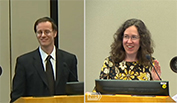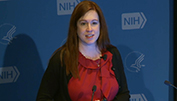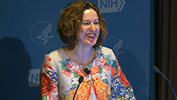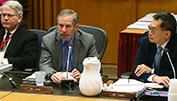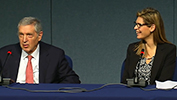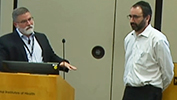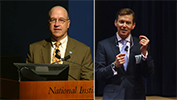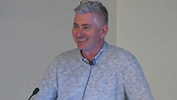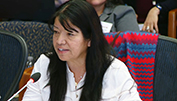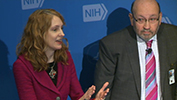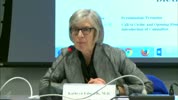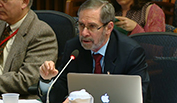-
- NIH VideoCast - Demystifying Medicine 2017: Obesity: Brown and Other Fat
-
- - Aaron Cypess, MD, PhD, MMSc, NIDDK, NIH and Rebecca Brown, MD, MHSc, NIDDK, NIH (2017/03/31)
- - Category : Demystifying Medicine
- The Demystifying Medicine Lecture Series is designed to help bridge the gap between advances in biology and their applications to major human diseases. Each lecture will feature a presentation on a major disease, including current research and advancements on treatments.
For more information go to https://demystifyingmedicine.od.nih.gov
NIH VideoCast - Demystifying Medicine 2017: Obesity: Brown and Other Fat
-
- NIH VideoCast - CC Grand Rounds: 1) Developing Multifaceted Cancer Trials: Integrating Laboratory and Clinical Research and 2) Beyond CD19: What is Next for CAR T Cell Therapy in Acute Lymphoblastic Leukemia
-
- - 1) Mark B. Gilbert, MD Senior Investigator and Chief, Neuro-Oncology Branch, NCI, NIH and 2) Terry J. Fry, MD, Investigator, Pediatric Oncology Branch and Head, Hematologic Malignancies Section, NCI, NIH (2017/03/31)
- - Category : Clinical Center Grand Rounds
- CC Grand Rounds: 1) Developing Multifaceted Cancer Trials: Integrating Laboratory and Clinical Research and 2) Beyond CD19: What is Next for CAR T Cell Therapy in Acute Lymphoblastic Leukemia (ALL)
For more information go to http://www.cc.nih.gov/about/news/grcurrent.html
NIH VideoCast - CC Grand Rounds: 1) Developing Multifaceted Cancer Trials: Integrating Laboratory and Clinical Research and 2) Beyond CD19: What is Next for CAR T Cell Therapy in Acute Lymphoblastic Leukemia
-
- NIH VideoCast - The gut microbiome: a master regulator of metabolism
-
- - Lora Hooper, Ph.D., Professor; Department of Immunology, University of Texas Southwestern Medical Center (2017/03/31)
- - Category : Immunology
- Immunology Interest Group Seminar Series
Humans and many other animals are home to enormous numbers of beneficial bacteria that profoundly influence health. The existence of beneficial resident microorganisms was first recognized in the late 1800`s by Louis Pasteur, who founded the field of medical microbiology. However, we???ve only recently begun to acquire a molecular understanding of how resident microorganisms contribute to our health. The Hooper lab has spent more than a decade studying how resident bacteria of the gut communicate with our own cells to shape our physiology, our development, and our ability to fight infectious disease. In my talk, I will discuss our ongoing efforts to unravel this important bacteria-to-human conversation. In particular, I will focus on our recent studies of how resident intestinal bacteria regulate mammalian metabolism.
Lora Hooper is a Professor in the Department of Immunology at the University of Texas Southwestern Medical Center, where she holds the Jonathan Uhr Endowed Chair in Immunology. She is also an Investigator of the Howard Hughes Medical Institute. She joined the UT Southwestern faculty in 2003 after completing a post-doctoral fellowship at Washington University and became Chair of the Immunology Department in 2016. During her fellowship training she became interested in interactions between intestinal bacteria and host cells in the mammalian gut. Her research team at UT Southwestern studies interactions between the intestinal microbiota and the immune system. The approaches used in her lab range from biochemical and structural approaches for understanding the molecular basis for intestinal immune responses, to mouse genetic approaches for identifying immune pathways that are important for maintaining host-microbial homeostasis. These studies are aimed at gaining a basic mechanistic understanding of how the immune system deals with symbiotic intestinal bacteria. More recently, her group has been exploring how the microbiota regulates metabolism and body composition. Her work is funded by the Howard Hughes Medical Institute, the National Institutes of Health, and the Welch Foundation. She was elected to the National Academy of Sciences in 2015.
NIH VideoCast - The gut microbiome: a master regulator of metabolism
-
- NIH VideoCast - 2018 Physical Activity Guidelines Advisory Committee Meeting 3 - March 2018
-
- - The U.S. Department of Health and Human Services, Office of the Assistant Secretary for Health, Office of Disease Prevention and Health Promotion (2017/03/30)
- - Category : Advisory Board Meetings and Workshops
- The 2018 Physical Activity Guidelines Advisory Committee will meet to deliberate science-based physical activity recommendations for the federal government to use in developing the 2018 Physical Activity Guidelines.
NIH VideoCast - 2018 Physical Activity Guidelines Advisory Committee Meeting 3 - March 2018
-
- NIH VideoCast - International Symposium on Malignant Mesothelioma 2017 (Day 1)
-
- - Mesothelioma Applied Research Foundation (2017/03/30)
- - Category : Conferences
- The 2017 International Symposium on Malignant Mesothelioma is the only conference of its kind to bring together scientists and patients alike. It covers topics such as mesothelioma science, treatment options, including clinical trials, immunotherapy, surgery, and pain management among many others. This conference is geared to attendees from all walks of life, including patients and their families, advocates, medical professionals, those who have lost loved ones to mesothelioma, and scientists.
For more information go to http://www.curemeso.org/site/c.duIWJfNQKiL8G/b.8598593/k.D685/Homepage.htm
NIH VideoCast - International Symposium on Malignant Mesothelioma 2017 (Day 1)
-
- NIH VideoCast - Incorporating mindfulness exercises into a parent training program: Outcomes of the After Deployment, Adaptive Parenting Tools/ADAPT program for military families
-
- - Abigail H. Gewirtz, Ph.D., University of Minnesota (2017/03/28)
- - Category : National Center for Complementary and Integrative Health
- The National Center for Complementary and Integrative Health (NCCIH) presents the Integrative Medicine Research Lecture Series. The series provides overviews of the current state of research and practice involving complementary health approaches and explores perspectives on the emerging discipline of integrative medicine. Dr. Abigail Gewirtz is a Professor in the Department of Family Social Science and Institute of Child Development, University of Minnesota. Dr. Gewirtz` presentation will focus on outcomes of the original ADAPT effectiveness trial, and in particular, mindfulness-related program process and outcome data (use and dosage of mindfulness exercises among fathers and mothers, and outcomes of the program on parent self-reported mindfulness and observational measures of parent-child emotion communication and parent avoidance.
For more information go to https://nccih.nih.gov/news/events/IMlectures
NIH VideoCast - Incorporating mindfulness exercises into a parent training program: Outcomes of the After Deployment, Adaptive Parenting Tools/ADAPT program for military families
-
- NIH VideoCast - The Neurobiology of Decision Making: A Window on Cognition
-
- - Michael N. Shadlen, M.D., Ph.D., Professor and HHMI Investigator, Department of Neuroscience, Columbia University (2017/03/28)
- - Category : Neuroscience
- NIH Neuroscience Series Seminar
The evolution of sophisticated brains has freed us from the immediacy of sensation and action by giving us the capacity for flexible decision-making. The evidence we obtain through our senses (or from memory) need not precipitate an immediate, reflexive response. Instead our decisions are deliberative and provisional, contingent on other sources of information, long-term goals, and values.
Dr. Shadlen???s lab believes the principles of brain function that underlie simple forms of reasoning and decision-making are also the building blocks of human cognition. Brain circuits support integration of evidence from diverse sources (for example, different senses and memory), assign more or less weight to cues that differ in their reliability, calculate expected costs and benefits associated with anticipated outcomes, process elapsed time to meet a deadline or to assess temporal cost, and implement rules (such as deciding on what to decide upon) and policies (balancing accuracy against speed). They believe they will one day manipulate and restore these basic mechanisms to treat brain disorders affecting cognition. Thus, their research will ultimately help patients with disorders of higher cognitive functions affecting personality, ideation, volition, awareness and decision making.
For more information go to https://neuroscience.nih.gov/neuroseries/Home.aspx
NIH VideoCast - The Neurobiology of Decision Making: A Window on Cognition
-
- NIH VideoCast - NCI Board of Scientific Advisors - March 2017
-
- - NCI, NIH (2017/03/23)
- - Category : Advisory Board Meetings and Workshops
- The 58th meeting of the NCI Board of Scientific Advisors
NIH VideoCast - NCI Board of Scientific Advisors - March 2017
-
- NIH VideoCast - Inaugural 2017 Michael E. DeBakey Lecture - Intentional Impact: The Legacy of Michael E. DeBakey Beyond the Operating Room
-
- - Shelley McKellar, PhD, Western University, Canada and George P. Noon, MD, Baylor College of Medicine (2017/03/23)
- - Category : History of Medicine
- ???Intentional Impact:??? The Legacy of Michael E. DeBakey Beyond the Operating Room
Shelley McKellar, PhD, The Jason A. Hannah Chair in the History of Medicine, Associate Professor with Joint Appointment with the Department of Surgery, Western University, Canada
A Brief Look at Michael E. DeBakey`s Role in Establishing the National Library of Medicine as It Is Today
George P. Noon, MD, Professor of Surgery, Michael E. DeBakey Department of Surgery, Baylor College of Medicine
Join us on this special occasion to learn about the legacy of Michael E. DeBakey as it exists in modern medical practice and in the ongoing public service of the National Library of Medicine.
For more information go to https://www.nlm.nih.gov/hmd/happening/lectures/lectures_2017.html
NIH VideoCast - Inaugural 2017 Michael E. DeBakey Lecture - Intentional Impact: The Legacy of Michael E. DeBakey Beyond the Operating Room
-
- NIH VideoCast - Aflatoxin: An Old Carcinogen Teaches Us New Tricks
-
- - John D Groopman, PhD, Professor, Johns Hopkins Bloomberg School of Public Health (2017/03/23)
- - Category : Stars in Nutrition
- Stars in Nutrition and Cancer
The aim of the lecture is to learn about the historic role that the dietary carcinogen aflatoxin has played in human liver cancer, to outline how mechanistic studies of aflatoxin has helped establish a paradigm for chemoprevention in high risk populations, and to project the emerging role of this agent in fatty liver disease and emerging data on liver cancer in Central America.
Dr. Groopman is the Anna M. Baetjer Professor of Environmental Health Sciences and Chair of the Department of Environmental Health Sciences in the Johns Hopkins University Bloomberg School of Public Health, and Professor of Oncology and Associate Director of the Cancer Center for Cancer Prevention and Control at Johns Hopkins School of Medicine and the Sidney Kimmel Comprehensive Cancer Center.
For more information go to https://prevention.cancer.gov/research-groups/nutritional-science/about-nutritional-science/stars-nutrition-and-cancer
NIH VideoCast - Aflatoxin: An Old Carcinogen Teaches Us New Tricks
-
- NIH VideoCast - Demystifying Medicine 2017: Fibrosis: Inflammation and Cirrhosis
-
- - Thomas Anthony Wynn, PhD, NIAID, NIH and Theo Heller, MD, NIDDK, NIH (2017/03/23)
- - Category : Demystifying Medicine
- The Demystifying Medicine Lecture Series is designed to help bridge the gap between advances in biology and their applications to major human diseases. Each lecture will feature a presentation on a major disease, including current research and advancements on treatments.
For more information go to https://demystifyingmedicine.od.nih.gov/
NIH VideoCast - Demystifying Medicine 2017: Fibrosis: Inflammation and Cirrhosis
-
- NIH VideoCast - CC Grand Rounds: 1) Macro Medical Errors and the Just Culture and 2) Working Toward High Reliability
-
- - 1) James K. Gilman, MD, CEO, Clinical Center, NIH and 2) Peter Pronovost, MD, PhD, Senior Vice President, Patient Safety and Quality, Johns Hopkins Medicine and Director, Johns Hopkins Armstrong Institute for Patient Safety and Quality (2017/03/23)
- - Category : Clinical Center Grand Rounds
- CC Grand Rounds: 1) Macro Medical Errors and the Just Culture and 2) Working Toward High Reliability
For more information go to https://www.cc.nih.gov/about/news/grcurrent.html
NIH VideoCast - CC Grand Rounds: 1) Macro Medical Errors and the Just Culture and 2) Working Toward High Reliability
-
- NIH VideoCast - Evolution of Sleep and of Cerebral Cortex
-
- - Gilles Laurent, Ph.D., D.V.M., Director, Department of Neural Systems and Coding, Max Planck Institute for Brain Research (2017/03/21)
- - Category : Neuroscience
- NIH Neuroscience Series Seminar
Dr. Laurent`s laboratory is interested in the behavior, dynamics and emergent properties of neural systems (typically, networks of interacting neurons or neuron populations), especially as these properties relate to neural coding and sensory representation. The lab focuses principally on olfactory and visual areas, combining experiments, quantitative analysis and modeling techniques. They tend to use "simpler" experimental systems such as the brains of insects, fish and reptiles to facilitate the identification, mechanistic characterization and computational description of functional principles.
The lab`s research is centered on neurophysiological approaches and on experimental data. They combine single-cell electrophysiological techniques (whole-cell patch-clamp, intracellular, extracellular recordings), in vivo tetrode recordings, imaging (intrinsic, calcium, multi-photon) with modern molecular techniques (viral infections and gene transfer, photo-activation and silencing).
A large component of the lab`s expertise is also based on quantitative models and data analysis, carried out "in house". Much of their prior work has benefited greatly from close and long-lasting collaborations with physicists, modelers and other quantitative experimentalists, with whom ideas and concepts were developed, tested and refined.
For more information go to https://neuroscience.nih.gov/neuroseries/Home.aspx
NIH VideoCast - Evolution of Sleep and of Cerebral Cortex
-
- NIH VideoCast - America???s Opioid Overdose Epidemic: What We Know and How Health Practitioners Can Help
-
- - Debra Houry, MD, MPH, Centers for Disease Control and Prevention (2017/03/18)
- - Category : Special
- NIDCR Clinical Research Fellowship Grand Rounds
In the United States, the number of drug overdose and opioid-involved deaths has been on the rise, with more than 50 percent of drug overdoses resulting in a death that involved opioid use. Between 2000 and 2015, more than 500,000 people died as a result of drug overdoses, and opioid overdoses are responsible for an estimated 91 deaths everyday nationwide. This presentation will focus on the epidemiology and history of the opioid overdose epidemic, the CDC???s activities to address overdoses (including the CDC???s Guideline for Prescribing Opioids for Chronic Pain), as well as resources for dental and medical practitioners.
NIH VideoCast - America???s Opioid Overdose Epidemic: What We Know and How Health Practitioners Can Help
-
- NIH VideoCast - NIH Tribal Consultation Advisory Committee - March 2017 (Day 1)
-
- - NIH (2017/03/17)
- - Category : Advisory Board Meetings and Workshops
- The TCAC is advisory to the NIH, and provides a forum for meetings between elected Tribal officials (or their designated representatives) and NIH officials to exchange views, share information, and seek advice concerning intergovernmental responsibilities related to the implementation and administration of NIH programs. It was established to help ensure that Tribes and AI/AN people have meaningful and timely input in the development of NIH policies, programs, and priorities. The NIH TCAC seeks to ensure that NIH policies or activities that affect AI/AN communities are brought to the attention of Tribal leaders.
NIH VideoCast - NIH Tribal Consultation Advisory Committee - March 2017 (Day 1)
-
- NIH VideoCast - NIH Tribal Consultation Advisory Committee - March 2017 (Day 2)
-
- - NIH (2017/03/17)
- - Category : Advisory Board Meetings and Workshops
- The TCAC is advisory to the NIH, and provides a forum for meetings between elected Tribal officials (or their designated representatives) and NIH officials to exchange views, share information, and seek advice concerning intergovernmental responsibilities related to the implementation and administration of NIH programs. It was established to help ensure that Tribes and AI/AN people have meaningful and timely input in the development of NIH policies, programs, and priorities. The NIH TCAC seeks to ensure that NIH policies or activities that affect AI/AN communities are brought to the attention of Tribal leaders.
NIH VideoCast - NIH Tribal Consultation Advisory Committee - March 2017 (Day 2)
-
- NIH VideoCast - Demystifying Medicine 2017: Genetic Disease Testing: Current Status and Future Prospects
-
- - Robert Nussbaum, MD, Chief Medical Officer, Invitae Corporation and Leslie Biesecker, MD, NHGRI, NIH (2017/03/16)
- - Category : Demystifying Medicine
- The Demystifying Medicine Lecture Series is designed to help bridge the gap between advances in biology and their applications to major human diseases. Each lecture will feature a presentation on a major disease, including current research and advancements on treatments.
For more information go to https://demystifyingmedicine.od.nih.gov
NIH VideoCast - Demystifying Medicine 2017: Genetic Disease Testing: Current Status and Future Prospects
-
- NIH VideoCast - CC Grand Rounds: Noninvasive Neuromodulation in Psychiatry: Stimulating the Science of Mental Health
-
- - 1) Matthew V. Rudorfer, MD Chief, Somatic Treatments and Psychopharmacology Programs, Division of Services and Intervention Research, NIMH, NIH and 2) Sarah H. Lisanby, MD Director, Division of Translational Research and Director, Noninvasive Neuromodulation Unit, Experimental Therapeutics and Pathophysiology Branch, NIMH, NIH (2017/03/16)
- - Category : Clinical Center Grand Rounds
- CC Grand Rounds: Noninvasive Neuromodulation in Psychiatry: Stimulating the Science of Mental Health
For more information go to http://www.cc.nih.gov/about/news/grcurrent.html
NIH VideoCast - CC Grand Rounds: Noninvasive Neuromodulation in Psychiatry: Stimulating the Science of Mental Health
-
- NIH VideoCast - Vaccines and Related Products Advisory Committee (VRBPAC)- March 2017
-
- - FDA (2017/03/15)
- - Category : Advisory Board Meetings and Workshops
- FDA/CBER Advisory Committee Program
145th Meeting of the VRBPAC ??? Strain Selection for the Influenza Virus Vaccines for the 2017-2018 Influenza Season
NIH VideoCast - Vaccines and Related Products Advisory Committee (VRBPAC)- March 2017
-
- NIH VideoCast - NCI Clinical Trials and Translational Research Advisory Committee (CTAC) - March 2017
-
- - Coordinating Center for Clinical Trials, NCI, NIH (2017/03/14)
- - Category : Clinical Trials and Translational Research
- The CTAC makes recommendations on the NCI-supported national clinical trials enterprise to build a strong scientific infrastructure by bringing together a broadly developed and engaged coalition of stakeholders involved in the clinical trial process.
For more information go to http://deainfo.nci.nih.gov/advisory/ctac/ctacmeetings.htm
NIH VideoCast - NCI Clinical Trials and Translational Research Advisory Committee (CTAC) - March 2017



